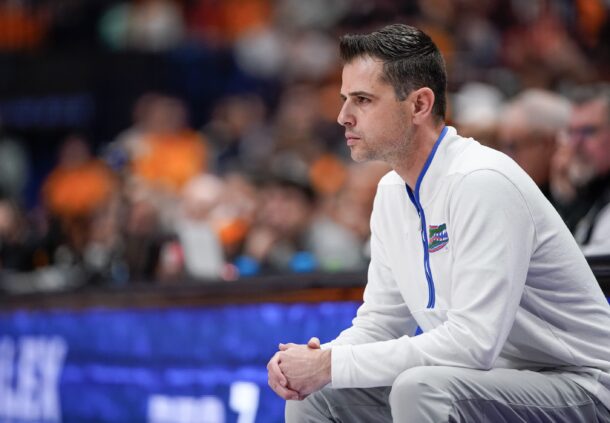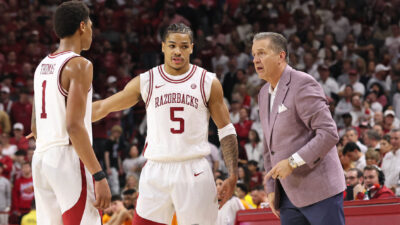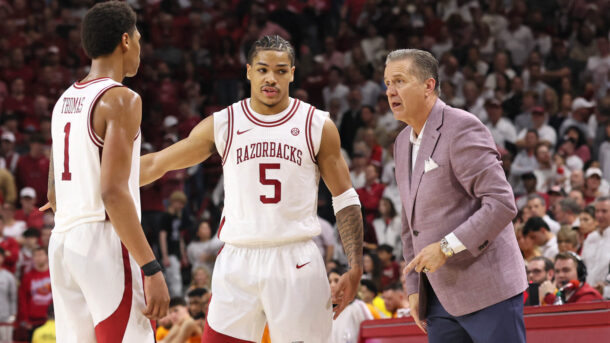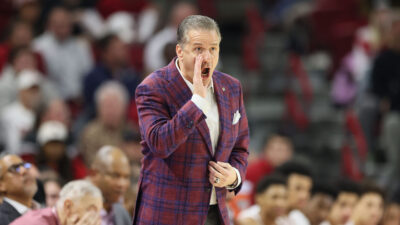
It’s only been 3 weeks since the Florida Gators cut down the nets as national champions, but the college basketball offseason feels as if it’s lasted longer given the constant activity in the transfer portal, which has been open since the end of the first weekend of the NCAA Tournament.
By the time the transfer portal closed last week, a staggering 45% of Division I players had entered the portal. Some entries were expected (here’s looking at you, Ja’Kobi Gillespie!). Others were surprising (Denzel Aberdeen, come on down!). No matter the reaction, there’s no escaping that the portal is a vital part of roster building in the NIL era of college basketball. Coming off a historic season where the SEC produced 14 NCAA Tournament teams, 7 Sweet 16 squads, 4 Elite Eight outfits, 2 Final Four programs, and the national champions, the race to at least try to equal that feat is on for 2025-26.
What SEC teams have fared the best in the portal to date? What teams still have work to do? We break it down below, assigning grades to every portal class in the SEC.
Alabama: C-
Nate Oats has feasted in the portal in recent years, adding Mark Sears, who became the best player in Alabama basketball history, along with building blocks like Grant Nelson and Aaron Estrada, who were players that helped the Crimson Tide reach the program’s first Final Four. Oats is a fantastic roster builder who has reached at least the Sweet 16 in the past 3 seasons. Doubt him at your own risk, even as the Tide begin life without Mark Sears.
Alabama’s been extremely active in the transfer portal since its Elite Eight exit against Duke, and there are some nice pieces, including Noah Williamson, a 7-footer from Bucknell who was the Patriot League Player of the Year. Williamson could improve his scoring around the basket, but he can block shots, rebound and pass. He averaged 17.6 points per game and 7.5 rebounds at Bucknell and should be impactful immediately in the SEC.
The other 2 centerpiece additions made less sense. Jalil Bethea was a McDonald’s All-American, but he had a borderline disastrous first season at Miami, where he shot poorly (38% from the field, 32% from deep) and proved to be a sieve defensively on a terrible Miami team. Portal reclamation projects are nothing new, but Oats has succeeded by mining the portal for productive mid-major players ready to take the next step. Underachieving Power 5 players are less likely to make the leap.
Taylor Bol Bowen is a slightly better take, especially if he proves to be capable in the pick-and-pop in Oats’ high tempo offense. Bol Bowen shot 41% from 3 last year on decent volume at Florida State. But he’s not a particularly impactful rebounder and while he can block shots at a high level, he was much quieter against top-100 competition, largely feasting on lesser foes and looking overmatched defensively in FSU’s games against Duke, Florida, Clemson, and Louisville, among others.
All told, an adequate haul for Alabama, but there’s not an All-SEC type add after the last few years where Oats consistently added those types of players. If Washington State transfer Cedric Coward had come in instead of committing to Duke, that would’ve changed this grade. But for now, it’s a “Satisfactory” and nothing more. Couple that with what Alabama lost in Derrion Reid, Mo Diabate, and Jarin Stevenson, and there’s at least some reasonable concern that this might just be a first weekend team in 2025-26, not the second weekend beasts we’ve grown accustomed to on the Capstone under Oats.
Arkansas: B+
Arkansas hasn’t made a huge portal splash, but when you return DJ Wagner, Trevon Brazile, and Billy Richmond and add Darius Acuff and Meleek Thomas from the high school ranks, you don’t have to do too much portal-wise. If Karter Knox and Adou Thiero return, this is a top 10 team in the preseason. If one returns, it’s probably a top 15 team.
Arkansas did add Malique Ewin, a physical and versatile big from FSU who will be a steady player capable of a massive night offensively, where he’s an efficient finisher in the paint. Nick Pringle adds rebounding and multiple years of experience in the SEC, having previously played for Nate Oats at Alabama and Lamont Paris at South Carolina.
Auburn: A-
Auburn has been active and productive, landing Kyshawn Hall of UCF, Kevin Overton of Texas Tech, KeShawn Murphy of Mississippi State, and Division II star Elyjah Freeman. Yes, the Tigers lose Chad Baker-Mazara, whose microwave offense and length defensively will be missed, but there’s a whole column to be written about why that loss is something Auburn can overcome, and it isn’t just because of CBM’s well-documented emotional volatility on the court. Losing CBM allows Auburn to upgrade defensively– and the Tigers did that by bringing in Hall, a much better on-ball defender than Baker-Mazara, who opponents attacked relentlessly late in the season.
Freeman is the guy who is most intriguing. He has outstanding size, shot 40% from deep, and has NBA scouts intrigued by his ability to get to the basket and finish. Chaney Johnson, another DII transfer, worked beautifully for Pearl, who coached at that level and knows what a DI player from those ranks looks like on film. If he plays well and Overton contributes buckets and helps space the floor, the Tigers will be elite again, especially if Tahaad Pettiford returns.
Florida: Incomplete
The reigning national champs got a late start to the portal thanks to a system that punishes teams for winning. Rightly focused on winning, the Gators did not start “portaling” until a day or two after cutting down the nets in San Antonio. Florida has addressed obvious needs since, adding Princeton star Xaivian Lee, one of the top point guards in the portal, along with Ohio transfer AJ Brown, a sharpshooting guard (38% three point shooter in 2024-25). Lee is a walking bucket, and his creativity off the bounce will help replace NCAA Most Outstanding Player Walter Clayton Jr., though admittedly, Clayton is irreplaceable.
Most importantly, the Gators retained NCAA Tournament star Thomas Haugh, who declined NBA Draft overtures to return to Florida for his junior season. One of the 5 most efficient players in the sport in 2024-25, per EvanMiya, Haugh may be the preseason SEC Player of the Year if Kentucky’s Otega Oweh is not.
Florida did suffer a blow, however, when Denzel Aberdeen, a key reserve on the championship team Todd Golden expected to start in 2025-26, turned down a strong offer from Florida to enter the portal, later committing to rival Kentucky. The loss of Aberdeen will sting, as he was a winner with championship experience and an outstanding defender.
The Gators are involved in multiple battles as the portal barrels towards the May 28 NBA entry deadline, but until Florida adds another backcourt starter, as expected, it’s hard to judge this portal class.
Georgia: B
Mike White lost Silas Demary Jr., a huge blow that takes Georgia out of preseason top 20 conversations, at least for now.
The good news is White retained tough-nosed guard Blue Cain and frontcourt talent Dylan James, who looks poised to break out as a junior in 2025-26.
To offset the loss of Demary, the Dawgs have added 3 players, Kannon Catchings, Justin Bailey and Jeremiah Wilkinson. The best talent of these is Catchings, a rangy, 6-9 forward who flashed NBA upside at BYU as a freshman. The most intriguing and proven to be productive piece is Wilkinson, the ACC Sixth Man of the Year who averaged 15.1 points per game and will give White something he lacked even with Demary Jr. in the fold — a safe, reliable primary ball handler.
Kentucky: A+
Big Blue Nation is brimming with anticipation after a monster portal haul that should give Mark Pope the deepest bench in America. Sure, sources tell SDS Kentucky spent around $17.5 million dollars to land this class, a staggering figure even by current NIL standards. But this wasn’t a thoughtless spending spree. Mark Pope had a plan and this roster makes sense as a collective unit.
Mouhamed Dioubate adds interior toughness and the ability to guard all 5 spots on the floor, a much-needed commodity on a team that lacked enough of those types of players a season ago. Denzel Aberdeen brings toughness, Lamont Butler-type perimeter defense, and championship experience to the locker room. He’s not an especially efficient offensive player, as he struggles in the pick and roll and allows the ball to stick at times with over-dribbling, but he did shoot 56% on corner 3s in 2024-25 so at a minimum, he is a floor spacer if, as expected, Mark Pope plays him off the ball at the 2 position. Jaland Lowe will start at point guard, and Jasper Johnson will complement both him and Aberdeen off the bench, likely logging starter-style minutes by March.
Kentucky has options outside of Otega Oweh on the wing as well, with Croatian Andrija Jelavic a dynamic scorer and the ability to play smaller with Tulane’s Kam Williams, who can play the 3 or 4 spot. .
The lone question mark is rebounding, especially if Jayden Quaintance is slow to recover from his ACL injury. However, a healthy Quaintance raises the ceiling here to national championship good, especially if Malachi Moreno, a consensus top-30 player in the 2025 class, is as advertised and able to contribute.
Put plainly, a monster haul for the Cats in year 2 under Mark Pope.
LSU: C
The Tigers lost 2 pieces with All-SEC upside in Curtis Givens III and Vyctorious Miller, 2 top-100 freshmen who lasted just a season under Matt McMahon. Corey Chest’s transfer to Ole Miss also hurts, given how productive the New Orleans native was for the Tigers as high energy freshman last season. Dedan Thomas, a productive but undersized point guard, is a nice get, as is Omaha star Marquel Sutton, a walking double-double for an NCAA Tournament team who will immediately upgrade the LSU frontcourt. But the talent heading out is at least equal to the talent coming in, and when you finish 15th in the league, that’s not the position you want to be in as Matt McMahon enters a vital fourth season.
Missouri: B
Sometimes the biggest gets are players you retain.
At Missouri, keeping Mark Mitchell, Anthony Robinson II, Trent Pierce, and T.O. Barrett in the fold is big-time. None of Missouri’s portal exits register as significant losses. That makes the modest portal additions of UCLA guard Sebastian Mack and a trio of bigs led by Shawn Phillips feel like Missouri is engaged in addition by subtraction. The Tigers kept the centerpieces of a team that had second weekend ceiling — and went to work improving the depth around them. Dennis Gates should dance again with this group next March.
Mississippi State: D+
The Bulldogs lost a substantial amount of production off Chris Jans’ third NCAA Tournament team, and that could get worse if star Josh Hubbard stays in the NBA Draft. The loss of enigmatic wing Riley Kugel feels like one the Bulldogs can weather, but KeShawn Murphy’s transfer within the SEC to Auburn is deeply painful. Murphy averaged 11.7 points and 7.4 rebounds at State while providing outstanding interior defense. He’ll be missed terribly. Kanye Clary, who missed most of 2024-25 with an injury, will also sting — he averaged 17 points per game at Penn State and would have played a nice role on this team in 2025-26.
To replace this production, Chris Jans has brought in a host of players, but few without question marks. Achor Achor spent most of last season hurt at Kansas State and shot just 33% from deep when he did play, a return to his mean after a 45% season the year prior. Georgetown guard Jayden Epps was inefficient offensively and undersized defensively in the Big East — betting on him being productive in the SEC seems ambitious at best and foolhardy at worst. Ja’Borri McGhee is a good shooter and had a nice NIT, but he’s undersized and a strange fit for Jans’ defense which requires length on the perimeter and in the passing lanes. Quincy Ballard is experienced and sound, but lacks the upside of Nwoko or Murphy.
In sum, there’s just not enough coming in to replace what’s going out, at least not yet.
Ole Miss: B+
The Rebels are the team I did not give an A to that I can’t wait to revisit next April. AJ Storr, a jewel of last year’s portal rankings who flopped at Kansas, is the largest reason. He’s a 3-level scorer with NBA upside. He just needs to be put in the right spots. Chris Beard, a master at reclamation projects, is the perfect coach for Storr. If anyone can squeeze the towel dry with Storr, it is Beard and Ole Miss. We also love Corey Chest, a high energy, team-first defender who can really attack the glass and play 5 spots. It’s a perfect basketball fit. Koren Johnson, last with Louisville, is undersized and not a plus defensively, but that’s not a bad buy low gamble. Would we love to see a star here — looking at you, PJ Haggerty? Yes. Is this a haul that makes Ole Miss Sweet 16 good again? Yes. A good grade that may deserve a great grade next spring.
Oklahoma: B
Nijel Pack, a key cog in Miami’s run to the Final Four in 2023, joins the Sooners along with Xzayvier Brown, who averaged 17.6 points per game at St. Joe’s and follows his stepdad to Soonerland. The duo provides the type of electric offense the team will lose when Jeremiah Fears heads to the NBA. They also help offset the loss of Duke Miles to Texas A&M. Still, the Sooners need to do more after losing 9 players to either graduation or the NBA. Derrion Reid, a big-time frontcourt talent who missed much of his freshman season at Alabama with an injury, adds skill and desperately needed size. The wild card for Moser is likely Notre Dame transfer Tae Davis, who averaged 15 points and 5 rebounds a game in South Bend last season but has big shoes to fill in replacing Jalon Moore, a team leader who busted out for Moser and the Sooners in last year’s run to the NCAA Tournament. If Davis can replicate Moore’s production, the Sooners should return to the Big Dance. But that’s a big “if” making the leap to the SEC.
South Carolina: C-
The Gamecocks lost Treyson Eaglestaff before he even arrived on campus, but getting Meechie Johnson back into the fold after his brief return to Ohio State is a massive win for a Gamecocks team that lacked any reliable guard production in 2024-25. Mike Sharavjamts was a weird take for a team that lacks shooting and wasn’t efficient offensively. The Utah transfer improves the Gamecocks in neither area. We do like Kobe Knox, though, a good defender who will help space things out for Johnson on the perimeter. Nordin Kapic, who inked with the Gamecocks from UC San Diego, is a skilled big man who should help in that regard too, especially with his ability to pass from the post. All told, it hasn’t been a bad portal for the Gamecocks, but there’s nothing to suggest this team will be better, either, especially with Collin Murray-Boyles off the NBA.
Tennessee: A
Ja’Kobi Gillespie will receive First-Team All-SEC votes which is all you can ask if you are replacing a program legend like Zakai Zeigler, as Rick Barnes must do this offseason. The conduit of Maryland’s Crab 5, Gillespie averaged 15 points and 4.8 assists per contest a season ago while shooting a dynamic 40% from 3. Because he’s undersized, he can be turnover prone against high-level physicality, a flaw which will be tested in the SEC. But Gillespie is one of the most proven commodities in the portal and he’ll fit seamlessly into Rick Barnes’ offense and culture.
The other notable add is Vanderbilt transfer Jaylen Carey. Undersized at 6-7, Carey can be outmanned at times against taller bigs, but he never gets outworked and plays with excellent technique.. A fiery competitor whose offensive game continues to evolve, Carey instantly upgrades Tennessee’s frontcourt offensively and should fit in beautifully on defense with his toughness and willingness to guard.
A superb portal for Rick Barnes, one of the best to ever do it.
Texas: B-
Dailyn Swain, who follows Sean Miller from Xavier to Texas, is special. He can guard 5 spots and made gargantuan improvements offensively as a sophomore at Xavier, improving his shooting percentages inside and outside by 10%. If that growth continues, there’s a little Thomas Haugh to his game, especially with his ability to pass and be a fulcrum in the pick and roll game and Miller’s patented horns sets.
Two different types of big men also signed up for year one under Miller in Austin, the most intriguing add being Matas Vokietaitis, who should beat out Lassina Traore for the starting job and build on his AAC Freshman of the Year campaign at Florida Atlantic.
The more concerning pieces for Texas so far are in the backcourt, but that’s okay, because even without Tre Johnson, the Longhorns return immense talent including Tramon Mark and Jordan Pope. That said, Simeon Welcher was a strange take. Yes, he torched Sean Miller’s Xavier teams at St. John’s. But he’s generally a poor shooter (29.7% from 3) who can’t finish at the rim (48% on 2s). That’s not exactly a SEC starter profile but is fine as a depth piece, I suppose.
It’s a good haul, but one that requires two good players (Swain and Vokietaitis) to take a leap to become great.
Texas A&M: Incomplete
Bucky McMillan was one of the last hires in the coaching cycle after Buzz Williams’ abrupt departure for Maryland.
As such, it’s not entirely fair to judge what’s happening with McMillan’s first roster, though Mackenzie Mgbako, the former B1G Freshman of the Year at Indiana, was a heck of a start to the Bucky Ball era. Marcus Hill, who was First Team All-MAC at Bowling Green before being serially misued by Kevin Keatts last year at NC State, is another add who seems like an excellent fit for McMillan’s uptempo brand of basketball. Sharpshooting guard Duke Miles (43% from 3 last year at Oklahoma) is another space and pace piece who makes sense.
With virtually the entire roster to replace, McMillan is off to a solid start, but the Aggies have plenty of work left to do.
Vanderbilt: C+
Let’s not beat around the bush. Losing Jaylen Carey and Jason Edwards to high profile Power 5 programs has to sting Mark Byington a bit.
But maybe trust the process? After all, Byington built one of the nation’s best portal classes a season ago on his way to a surprising NCAA Tournament appearance in his first season in Nashville. That earned trust, and it’s why I still have Vanderbilt as a “C+” despite the costly loss of 2 surefire 2025-26 starters.
Frankie Collins is an experienced point guard who can defend and distribute. Tyler Harris adds length and athleticism to a team that lacked it too often last season. Mike Harris is a physical guard who can shoot the 3 and rebounds well. UNC transfer Jalen Washington is coming off his best season at North Carolina, where he set career bests for points, rebounds, and blocks per game. He’ll reunite with Tyler Nickel, another former Tar Heel playing for Byington in Nashville.
These are all thoughtful takes, I think, that will complement returning big Devin McGlockton and key reserve Tyler Tanner and build a strong nucleus for Byington in year 2 with the Commodores.
Neil Blackmon covers SEC football and basketball for SaturdayDownSouth.com. An attorney, he is also a member of the Football and Basketball Writers Associations of America. He also coaches basketball.






